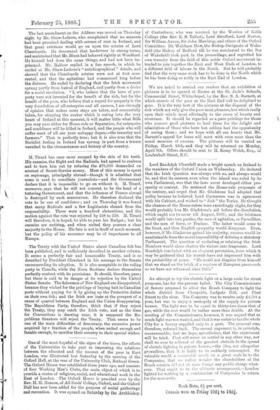Lord Randolph Churchill made a bright speech on Ireland to
the members of the Oxford Union on Wednesday. He declared that the Irish Question was always with us, and always would be, and that its essence, even when the island was ruled by its own Parliament, was that the laws never developed either pro- sperity or content. He reviewed the Home-rule proposals of the century, and urged that Mr. Gladstone had adopted that policy because he believed Lord Carnarvon was in agreement with his Cabinet, and wished to "dish" the Tories. He thought the chances of the Home-rulers were exceedingly slight, for they would probably lose Mr. Gladstone's aid before the dissolution, which ought not to occur till August, 1893; and the Irishmen would split into two parties, the men of agitation, or Paruellites, and the men of force, or Fenians. The latter would come to the front, and then English sympathy would disappear. Even, however, if Mr. Gladstone gained his majority, success would be unattainable from the moral impossibility of defining a statutory Parliament. The question of excluding or retaining the Irish Members would alone shatter the victors into fragments. Lord Randolph concluded with an eloquent peroration, from which it may be gathered that his travels have not impressed him with the probability of peace. "He could not disguise from himself that we stand on the brink of a rupture of European peace such as we have not witnessed since 1815."






































 Previous page
Previous page